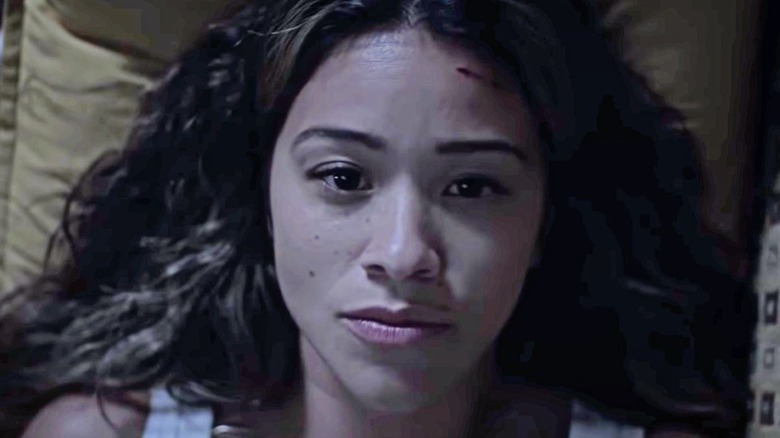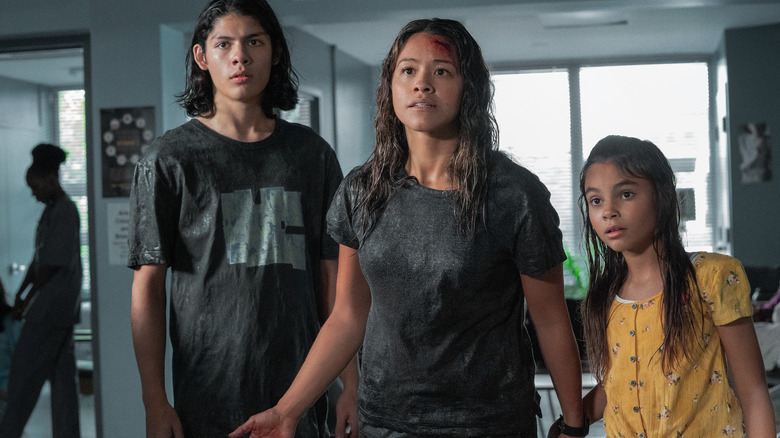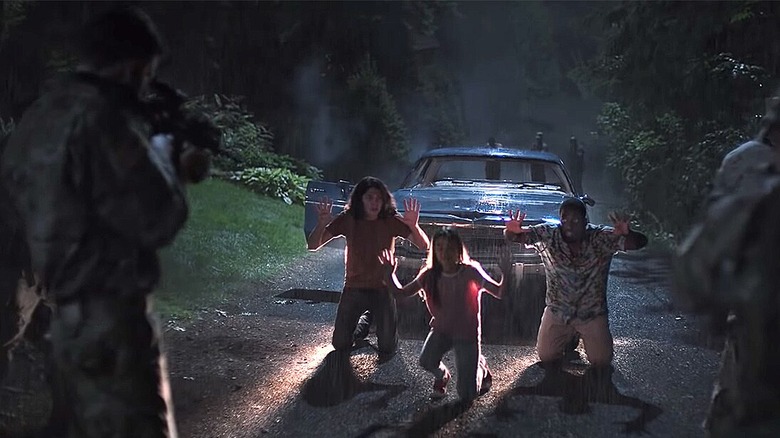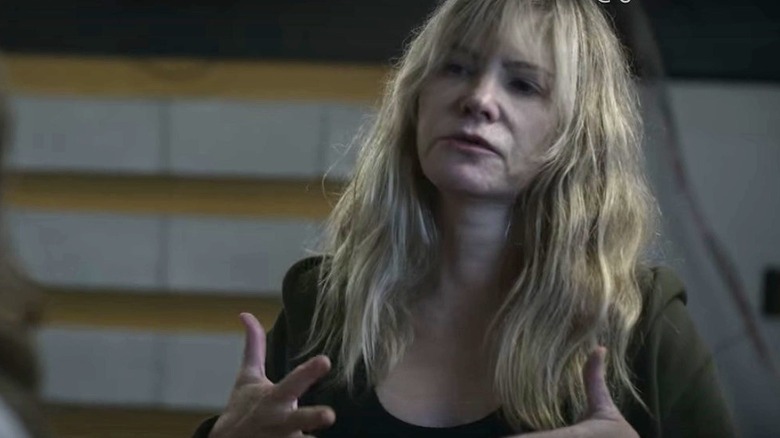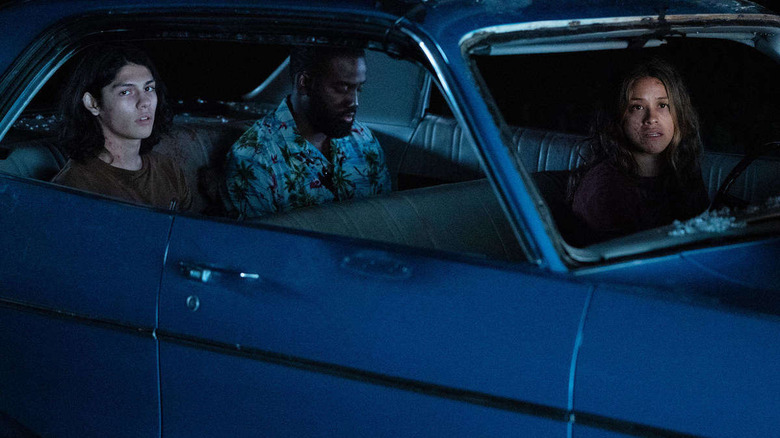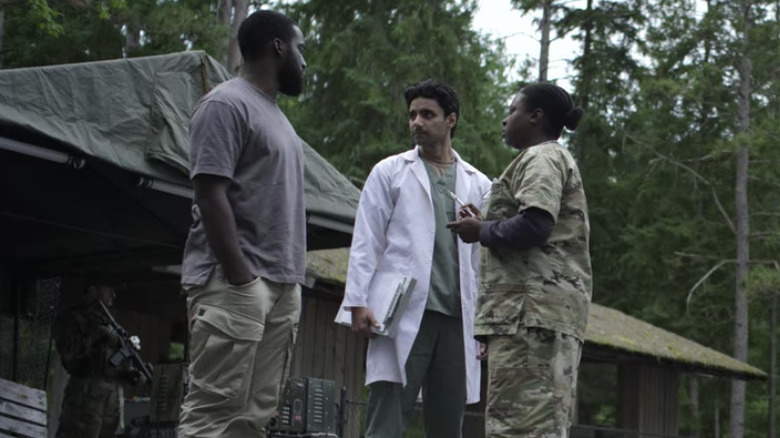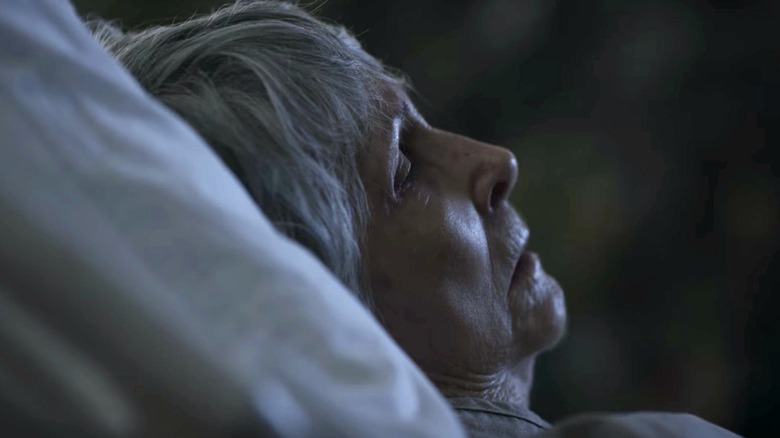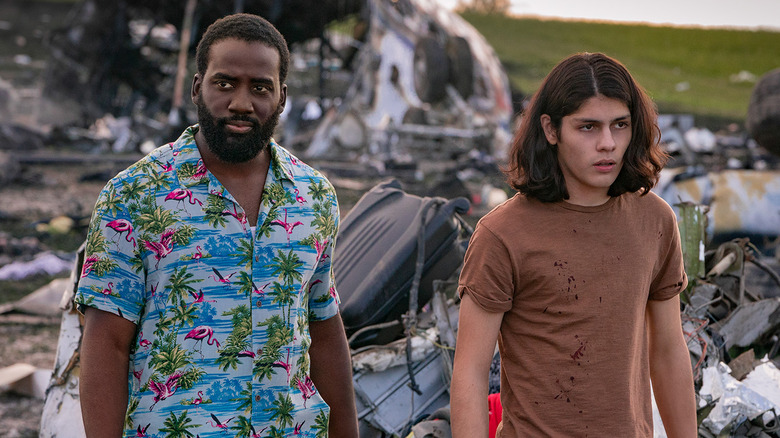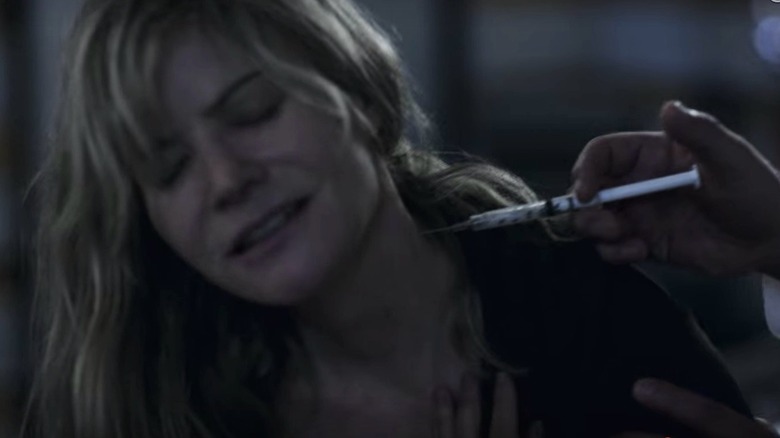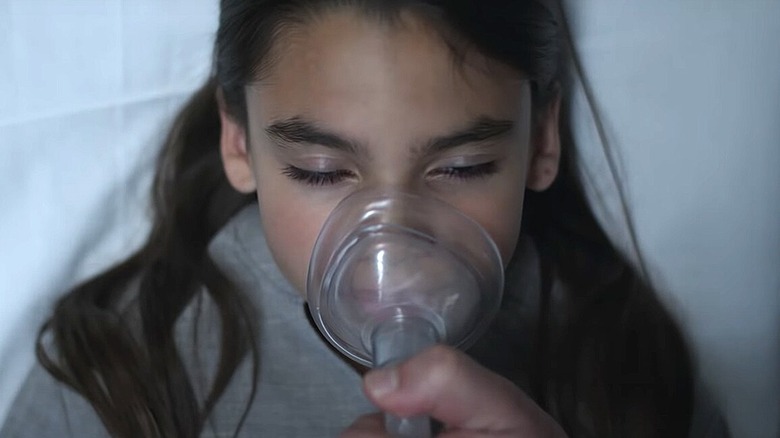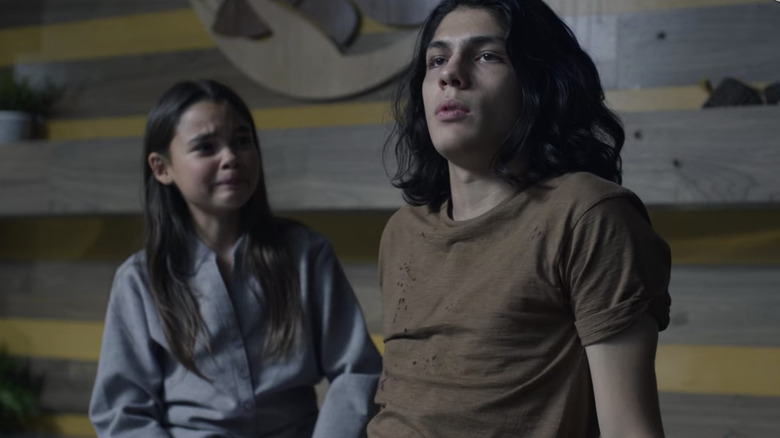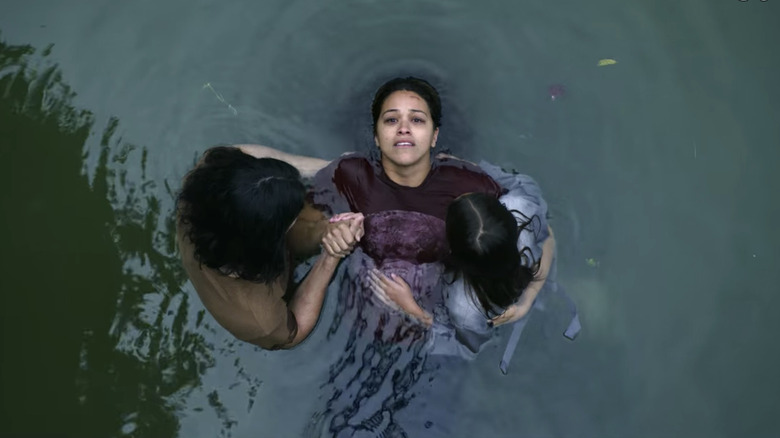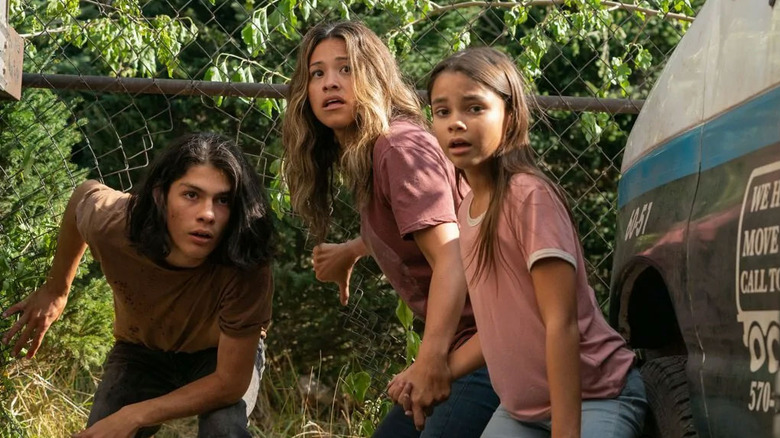The Ending Of Awake Explained
Most people have experienced the occasional sleepless night, but Netflix's apocalyptic thriller "Awake" takes that experience to a whole new level. When a mysterious event knocks out power and causes people to lose the ability to sleep, single mother Jill (Gina Rodriguez) realizes that her daughter Matilda (Ariana Greenblatt) — who can still sleep — may possess the answers that could save the world.
Of course, with no one sleeping, critical thinking on the decline, and paranoia increasing, things escalate quickly as Jill tries to figure out how to keep her family safe while searching for answers. And with Jill's own cognitive function deteriorating the longer she goes without sleep, the harder it becomes for her to make sense of what's happening — and in turn, the more difficult it becomes for the audience to follow along. But don't worry; whether you dozed off or simply had trouble keeping up with the increasingly disorienting narrative, here's the ending of "Awake" explained.
Spoilers ahead.
What caused the sleep disruption?
It takes a while for Jill or anyone else to realize they can't sleep anymore. When the event happens, Jill is driving and only notices that the radio signal goes on the fritz; she then loses control of the car. Later, Jill and others throw around various theories to explain the electronics blackout, including an electromagnetic pulse, a terrorist attack, and (strangely) the idea that the Chinese manufacturers of the equipment decided to turn everything off. However, while most of these explanations are quickly dismissed, it takes a while for a serious hypothesis to be proposed in their place.
Eventually, Dr. Murphy (Jennifer Jason Leigh) tells Jill that their best guess is that it was a solar flare that somehow disrupted humans' electromagnetic wiring and interfered with their glymphatic system, while also knocking out satellites and frying electronics. The glymphatic system clears waste from the nervous system during sleep. With no one sleeping, that waste would instead build up, causing many of the disturbing symptoms that we see in "Awake." However, this is still only a theory, and the movie never definitively explains the event beyond this.
Can you really die from lack of sleep?
"Awake" centers around the premise that if human beings don't sleep, they'll die. Indeed, by the end of the film, after a week without sleep, Jill definitely appears to be on death's doorstep, unable to speak or really even move anymore. Earlier in the film, Brian (Finn Jones) warns Jill that prolonged lack of sleep will result in a loss of critical thinking, hallucinations, motor failure, and eventually will lead to organ failure, paralysis, and ultimately, death. For the rest of the film, Jill and the other characters race against the clock to find a cure, knowing that if they don't, they'll all die.
In real life, scientists don't know conclusively that prolonged sleep deprivation leads to death in humans, although studies done on rats have shown that a total lack of sleep will lead to death. However, there is plenty of evidence that even just a couple days without sleep can result in similar symptoms to those seen in "Awake," including difficulty concentrating, paranoia, memory problems, speech problems, tremors, hallucinations, anxiety, and paranoia. After a few days without sleep, brain function deteriorates, which can lead to organ failure and potentially death.
How long was Jill awake?
The world record in sleep deprivation is held by Randy Gardner, a man who, at the age of 17 in 1965, stayed up for 264 consecutive hours, or just about 11 days, and recovered fully afterward. This is longer than Jill stays up in "Awake," yet she seems on the verge of death after just seven days. While staying awake for a week would definitely not be pleasant, it likely wouldn't be fatal for a person in good health.
However, earlier in the film, Brian tells Jill that whatever caused the sleeplessness is causing symptoms to accelerate from the rate at which they'd typically appear. He says that symptoms are appearing 2-3 times quicker than they should, which shrinks the window of time in which humanity will be able to function without sleep. So while only a week has passed for Jill by the end of the film, the effects of sleeplessness on her body are probably closer to the symptoms for going without sleep for two or three weeks, past Gardner's record.
Why did soldiers start shooting everyone at the end?
It's probably not the greatest idea to put a bunch of semi-automatic weapons in the hands of people who are deep in the weeds of insomnia-induced psychosis, but that's exactly what the group at the Hub have done by the time Jill arrives with her children toward the end of the film. Of course, the people making those decisions also had their judgment severely impaired due to their own sleep deprivation, so it's understandable that they'd make some bad calls. Unfortunately, this one turned out to be fatal for most of them.
It all starts with a pinecone. After nearly a week of no sleep, one of the soldiers either hallucinates or merely incorrectly interprets the sluggish sensory signals sent to his brain, and thinks the pinecone lying harmlessly on one of the paths of the Hub is actually a grenade. He kicks it out of the way and starts shooting at the imaginary bad guys he assumes are attacking, setting off a chain reaction of other soldiers hearing gunfire and also assuming they are under attack. But due to their impaired cognitive function, paranoia, and heightened anxiety, the soldiers are incapable of differentiating between friend and foe. This leads to them shooting each other, along with the various medical and scientific personnel at the Hub, since their sleep-deprived brains can't process what's really going on.
What was Dr. Murphy doing at the Hub?
At the beginning of "Awake," Dr. Murphy tells Jill that she's going with the military to the secret Hub in order to try to get to the bottom of what's happening. She reminds Jill that the two of them were the "get-answers people over there," and asks for her help again. "I can't do that anymore," Jill answers cryptically, alluding to a dark past. It's clear that Jill and Dr. Murphy previously served in the military together overseas, and that the nature of their work was something Jill is trying to distance herself from now.
Later, when Jill shows up at the Hub, we see that they've been running tests on the one woman they've found who can sleep. She seems to be being held against her will, asking Jill to help her escape, and implying that the tests have been relentless and invasive. We also see that they've removed the skull cap from an alert chimpanzee. As she becomes more desperate to find answers, it seems Dr. Murphy is willing to cross more ethical boundaries, implying that she's willing to experiment on both of Jill's children in an attempt to find a cure, something Jill begs her not to do. However, the Hub is destroyed and Dr. Murphy is killed before her work can uncover any useful answers.
What was Jill's plan in going to the Hub?
Jill spends most of the movie trying to get her family to the Hub, but once they get there, she tells her children to hide while she goes in alone. It seems a little odd, since it's implied that Jill's motivation is to get Matilda to the Hub so that she can help Dr. Murphy find a cure. Or at least, that's what she allows her son to believe. However, throughout "Awake," we see Jill trying to give Matilda lessons in survival, including how to drive, how to shoot a gun, and how to look up information using a library card catalog. It doesn't seem like the behavior of a mother who thinks her daughter will unlock the key to a cure.
Once Jill reaches the Hub, though, we see what her true plan was. She never intended to hand Matilda over to Dr. Murphy; rather, she had hoped to free the other woman who was able to sleep and convince her to raise Matilda. Jill figured that she, along with the rest of humanity, would all be dead in a few days, and that this woman was Matilda's only chance to survive. Unfortunately, she never manages to see her plan through to fruition, since the woman dies shortly after Jill arrives.
What were the injections the doctors were giving?
No closer to coming up with a cure for the sleeplessness, the Hub doctors figured out a way to buy themselves some time with a special cocktail of "anti-inflammatories, stimulants, [and] other things," injected straight into the carotid artery in the neck in order to deliver it to the brain faster. One doctor says this injection "reduces the beta-amyloid," which is a protein fragment that some scientists suspect builds up in the brains of Alzheimer's patients, inhibiting the brain's function.
With everyone's glymphatic system malfunctioning, it appears that the Hub scientists hypothesized that beta-amyloid was building up in people's brains, contributing to cognitive processing deficits. The cocktail couldn't fix the problem, but it could stimulate their brains, reduce the inflammation caused by the beta-amyloid, and restore a little bit of their alertness and ability to concentrate. Since they were racing against the clock for a cure, every minute they could postpone the inevitable increased their odds of success. Sadly, Dr. Murphy and her team were still unsuccessful in finding a cure, but it wasn't for lack of trying.
Why could the other patient sleep?
We never get a clear answer about why the other woman at the Hub is able to sleep, but we get a significant clue when Jill first meets her. After Jill begs her to watch over Matilda once she breaks her out, the woman tells Jill, "I'm the one that needs help. I was supposed to be dead months ago." Later the next day, the woman finally passes away in her sleep.
If the woman has been terminally ill for months, and was in fact only hours away from death when Jill met her, it seems likely that her heart may have stopped earlier in the week, shortly after the cataclysmic event took place — similar to Matilda. However, given how long she'd been ill, that may not have been the first time she'd had to be resuscitated, leading the doctors to overlook it as the cause of her immunity to the sleeplessness epidemic.
Why wasn't Dodge deteriorating as fast as the others?
Although many of the people Jill meets during the course of "Awake" seem to be even worse off than she is, and present a threat due to their rapidly escalating paranoia, anxiety, and inability to reason, the exception is Dodge (Shamier Anderson), an escaped prisoner who steals her car with Matilda inside, then decides to pick up Jill and Noah as well. Although Dodge and Jill are initially wary of one another, they quickly become allies, and he serves as an ally and protector for her and her children up until he's killed during the uprising at the Hub.
It seems a little strange that Dodge seems to remain largely in control of himself and can still perceive reality mostly accurately, even as everyone around him rapidly deteriorates. But there are two factors that may contribute to him remaining relatively clear-headed. The first is that he mentions at one point that he barely slept anyway, banking only a couple hours of sleep a night. Since he was already used to functioning on minimal sleep, it's possible that the symptoms of extreme sleep deprivation were slower to catch up with him. Additionally, he received the same anti-inflammatory cocktail that the doctors did, which may have been more effective on him than the others, since his symptoms weren't as severe in the first place.
What happened to Dr. Murphy?
Although most of the personnel at the Hub wind up being taken out by friendly fire, Dr. Murphy meets a different — yet equally deadly — fate. After their first patient who is able to sleep dies, Dr. Murphy decides she can't hold back in her study of Matilda, and decides to bring Noah in so she can compare the two of them. We never learn the extent of exactly which procedures Dr. Murphy is proposing, but based on the horrified reactions of Jill and the other doctor — and the conscious chimp with the exposed brain on the table beside Matilda — we can surmise that whatever she's planning is pretty extreme.
However, before Dr. Murphy can proceed with any procedures, chaos breaks out in the Hub. In the mayhem, another doctor prepares an injection of the anti-inflammatory cocktail for Dr. Murphy, but intentionally doesn't remove the air from the needle before injecting it into her carotid artery. A moment later, Dr. Murphy collapses in pain and presumably dies of an air embolism, an air bubble that causes a blockage in one of her blood vessels. As the other doctor prepares the injection, he says they're "sacrificing the child for no reason," and later apologizes for his actions, saying he "had to." One can surmise that he'd decided experimenting on Matilda was futile, and killed Dr. Murphy in order to save her.
Why could Matilda sleep?
Throughout most of "Awake," the biggest question is why Matilda can sleep while almost no one else can. For much of the film, the answer remains a mystery, but it's Matilda herself who finally comes up with a theory right at the end. Immediately after the event which caused the sleeplessness, Jill's car is knocked into a lake, with both children inside. Jill frees Matilda first, followed by her son Noah (Lucius Hoyos), but Matilda still inhales enough water to nearly drown. Fortunately, she's pulled to safety by a local sheriff and resuscitated using CPR, although her heart temporarily stopped in the process.
Matilda's theory is that "dying" — or, more accurately, her heart stopping — somehow rebooted her body, neutralizing the effects of the event that caused the sleeplessness. She realizes the common thread when Noah's heart also stops after he's electrocuted; they're able to revive him using a defibrillator, and he's able to sleep again.
How was Noah cured?
For most of "Awake," it seems as though Matilda is the only one who will survive the event that robbed humanity of the ability to sleep, and that her mother and older brother are doomed. After the situation at the Hub degrades, with the soldiers assigned to guard the facility turning on one another and attacking the scientists, Noah finds himself freed from his restraints, but by then he's badly hallucinating.
He comes across an electrical cable on the floor and picks up a discarded scalpel. Thinking the wire is a fish, he attempts to gut it like his dad once taught him to do, but once the scalpel makes contact with the wire, it electrocutes him, stopping his heart. Matilda retrieves the defibrillator and Jill shocks him, restarting his heart — but she and Matilda forget to stand clear, and are both shocked as well. Matilda is knocked unconscious, and when she wakes up hours later, she realizes that Noah is alive, but sleeping. She wakes him up and he says he was dreaming, proving that he can sleep again. Matilda realizes that when his heart stopped and was restarted, it cured him of his sleeplessness.
Does Jill survive?
Although both of her children regain their ability to sleep by the end of "Awake" and are able to think and function clearly again, Jill is in bad shape. After a week without sleep, she can barely even move by the end of the film. She musters up enough strength and coherence to identify herself as her children's mother in order to save them one last time, but that appears to use up what little remained in her reserves, and she goes catatonic afterward. It seems that the organ failure and brain death that Brian forecasted at the beginning of the film can't be far off.
However, once Matilda realizes that stopping and restarting the heart seems to be the key to regaining the ability to sleep, she and Noah hatch a risky plan. Dragging their mother to a nearby pond, they hold her underwater until she goes limp, then pull her out and attempt to resuscitate her using CPR. As Noah performs chest compressions on her lifeless body, the screen cuts to black, but just before the credits roll, we hear the sound of Jill taking a gasping breath. Since she was incapable of losing consciousness, and therefore must have briefly died, we can deduce that the plan worked.
What's next for Jill's family?
While Jill's family beats the odds and manages to regain the ability to sleep by the end of "Awake," things still don't look promising — for them or anyone else. Stopping and restarting a person's heart is far from a safe or reliable cure, and likely won't be reproducible in any sort of scalable way, if they can even find a way to communicate what they did to anyone in power — no mean feat in and of itself, since satellites and most electronics are still down. Plus, with the accelerated rate of symptom progression, much of the world is likely already dead.
The few survivors would be the people who just happened to have their heart restarted at some point during the week of sleeplessness. Since healthy people don't tend to fall into this category, there are probably only a very small number of people who can both sleep and are in good enough shape to fend for themselves in a post-apocalyptic world. The supply chain would have totally crumbled, as well as any sort of communication infrastructure, leaving Jill and her kids entirely on their own. So whatever they do next, they're going to have to be resourceful, and rely mostly on themselves.
